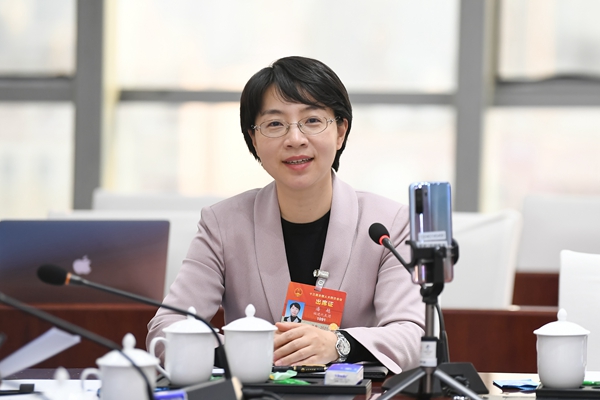China to pursue high-standard opening-up for more win-win outcomes
- By Zhang Liying
 0 Comment(s)
0 Comment(s) Print
Print E-mail China.org.cn, March 9, 2021
E-mail China.org.cn, March 9, 2021
China will pursue a high-standard opening-up and usher in a new stage of win-win cooperation, according to the draft 14th Five-Year Plan (2021-2025) for National Economic and Social Development and the Long-Range Objectives Through the Year 2035.
The State Council has submitted the document to the ongoing fourth session of the 13th National People's Congress (NPC) for lawmakers to review.

Pan Yue, a deputy to the 13th NPC, said that through its high-standard opening-up, China is expected to play a more active role in improving global economic governance.
"Rising trade protectionism and the backlash against globalization pose serious challenges to the global governance system. In the post-pandemic era, China will remain committed to building a community with a shared future for mankind, and strive to contribute Chinese wisdom to the improvement of global governance," Pan said.
Pan, who is also a professor at the School of Economics of Xiamen University, said that China's economic opening-up in the coming years will feature higher-quality "bringing in" and "going global."
"China will encourage more foreign investment in high-tech industries, and at the same time accelerate the ability of domestic high-tech companies to meet international market demand," she said.
Pan also emphasized the importance of a strong domestic market in taking opening-up to a higher level. Amid global economic uncertainties, China is fostering a new development paradigm in which domestic and overseas markets reinforce each other. Unleashing the potential of the domestic market doesn't mean China cutting off from the world, but sharing opportunities, she explained.
Continued advances were made in China's opening-up last year despite COVID-19. Pan summed up the progress in the following way: foreign direct investment (FDI) inflows reached a record high; the structure of FDI was optimized with the high-tech industry in particular registering a steady increase; the threshold for foreign investment was lowered; and the business environment was improved.

Data from the Ministry of Commerce showed that FDI into the Chinese mainland, in actual use, grew 6.2% year on year to a record 999.98 billion yuan ($153.39 billion) in 2020. Meanwhile, the high-tech service industry increased 28.5% over the previous year, with R&D and design services surging 78.8% year on year.
Last year, China cut the number of items on the national negative lists for foreign investment and for foreign investment in pilot free trade zones, to 33 and 30, respectively.
Pan said the implementation of China's law on foreign investment has contributed significantly to the growth in investment from overseas. "The law has boosted the confidence of foreign investors in the Chinese market and helped stabilize the country's economic recovery."
China's foreign-investment law was adopted at the second session of the 13th NPC in 2019 and came into effect on Jan. 1, 2020. The law provides foreign capital with easier market access and reduces restrictions on investors.
On further optimizing the business environment to promote a higher-level of opening-up, Pan suggested establishing more digital administrative management platforms to improve service efficiency and ensure that enterprises can process matters at a single window and without the need to make a return visit.
She also advised promoting the development of the smart court system to make judicial processes more intelligent and to better protect the lawful rights and interests of businesses.






Go to Forum >>0 Comment(s)